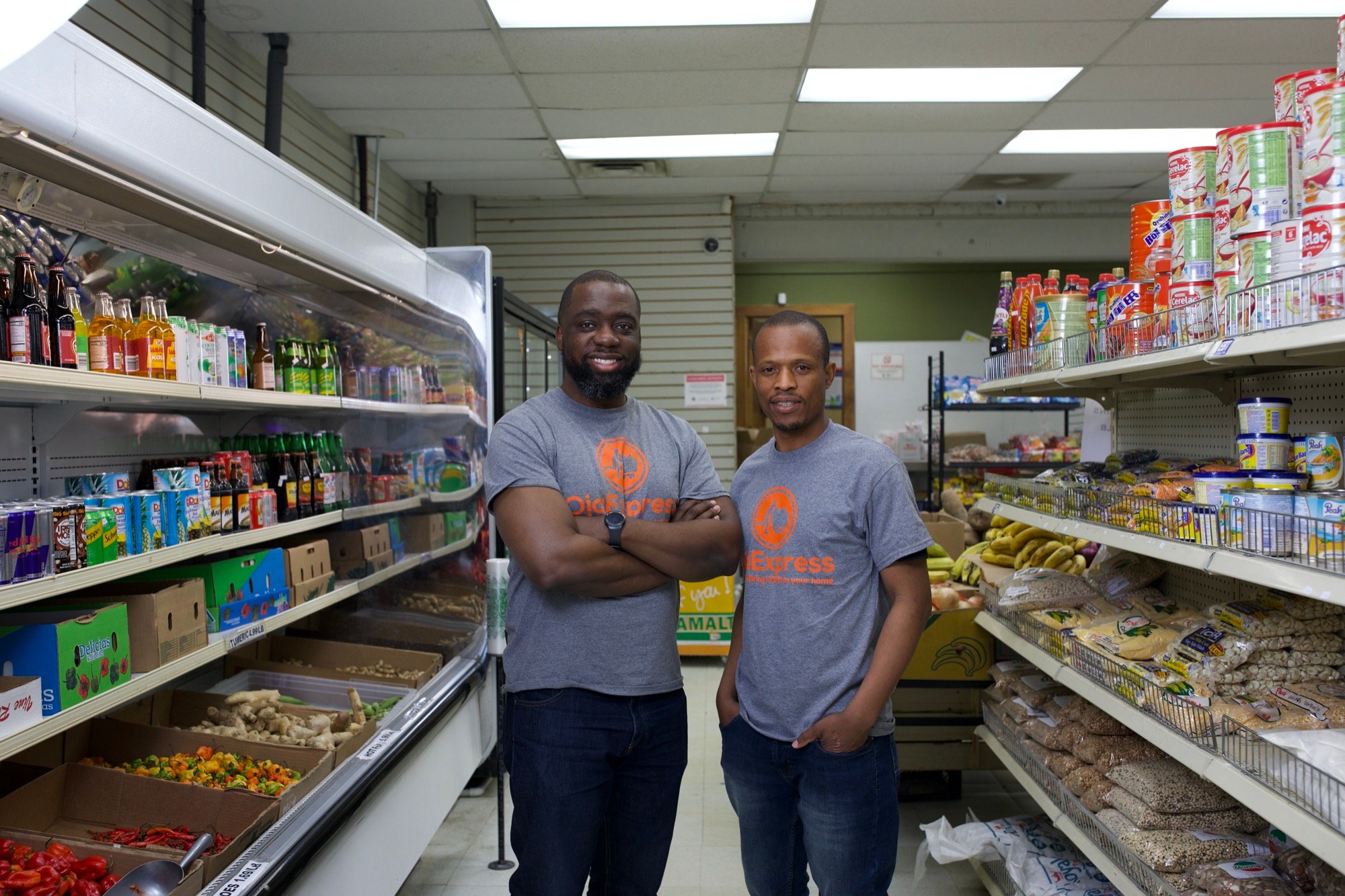Small Business Spotlight: OjaExpress, Designed By and For Immigrants, Brings Same-Day Delivery to Ethnic Grocery Stores

Boyede Sobitan, left, and Fola Dada founded OjaExpress to bring same-day delivery to ethnic groceries.
When Boyede Sobitan worked as a healthcare consultant, traveling four or five days out of every week, his return home to Chicago was often met with a request from his Nigerian mother: Would he accompany her to the African grocery store?
Sobitan’s family had long frequented La Fruteria, a store on Chicago’s South Side specializing in African and Caribbean products such as Ghanaian yams and custom cuts of goat meat. Hoping to save himself the trip after a long week on the road, Sobitan tried to order online. But it wasn’t an option.
Sobitan discovered that friends faced similar frustrations: they could get their regular groceries delivered through services like Peapod or Instacart, but they had to travel in person, often long distances, to pick up culturally specific foods.
“These stores lacked digital integration,” Sobitan said. He reached out to his friend Fola Dada, a Nigerian immigrant who worked as a software engineer at a fintech firm, and together they created OjaExpress to bring the convenience of same-day grocery delivery to immigrant communities yearning for a taste of home.
“A lot of underrepresented communities, when we had problems we would wait for someone else to solve them,” said Sobitan, who grew up in Chicago’s Uptown neighborhood and now lives in Bronzeville. “As a healthcare consultant I learned how to solve problems myself.”
OjaExpress, which transitioned from passion project to venture-backed business in 2020, bills itself a platform designed by and for immigrants to be “the United Nations of food at your fingertips.” The company has about a dozen ethnic grocery stores on its platform, most of them selling African and Caribbean products and others catering to Indian and Hispanic customers. It currently operates only in Chicago, but a significant expansion is afoot.
More than 30 stores are poised to join the OjaExpress platform, which aims to add 100 stores by the end of 2022. It plans to enter new markets, starting with Houston and Washington, DC this year, and serve more “cultural communities” by partnering with grocers specializing in Asian, Middle Eastern, and European foods.
In addition to offering specialty products difficult to find in mainstream grocery stores, OjaExpress intends to provide a “culturally competent” experience for shoppers, who include not only immigrant families but also foodies eager to explore different cuisines.
“When you come to our site, Do you feel seen? Do you feel heard? Do you feel that we understand you as a culture and a family?” Sobitan said.
OjaExpress, which participated in the Polsky Center’s Small Business Growth Program in 2019 and afterwards incubated at the Polsky Exchange, in December was recognized with a Chicago Innovation Neighborhood Award at an annual event honoring the city’s most promising startups.
The award was a welcome validation for the fledgling entrepreneurs, who have learned from initial missteps.
“I wouldn’t recommend it, to do it the way we did it,” Sobitan said. “We didn’t really understand startups or nuances of the market.”
OjaExpress launched as an app listing 100 products that shoppers could order and the company would deliver. The founders later realized it would have been better to start by forming partnerships with stores.
“Creating a solution is one thing, creating a service that is impactful requires more buy-in,” Sobitan said. “We have to solve the store’s pain point as well as the customer’s pain point.”
OjaExpress now offers software as a service to small- and medium-sized grocery stores to help them digitize inventory, sell products online, and access a network of delivery drivers. The company has formed delivery partnerships with DoorDash and similar services so that it doesn’t have to manage its own driver fleet.
Stores pay a monthly fee to be listed on its platform. Customers pay delivery and service fees.
The potential audience is significant. Some 45 million immigrants call the U.S. home, about 14% of the population, plus their families. Nearly 1 million international students attend U.S. universities, and OjaExpress hopes to work with schools to offer its service to those who might be craving familiar meals.
“They come all the way across the world to study at University of Chicago,” Sobitan said. “We could be that link to their home.”
Sobitan initially joined the Polsky Exchange because it was the closest coworking space to his home. While there he discovered the Small Business Growth Program, where he learned how to effectively network, think from a product-solution standpoint, and navigate the intricacies of sales.
OjaExpress recently raised a pre-seed round after several years of being bootstrapped by its founders. The difficulty of fundraising was a “rude awakening,” said Sobitan, who estimates they talked to 200 venture capital firms that turned them down.
There are other challenges on the horizon. The Great Resignation has left many stores short-staffed and unable to focus on going digital. Supply chain problems have sent some food prices skyrocketing, making it hard to offer customers value.
But while Sobitan is new to food and startups, he feels his experience in healthcare has prepared him to attack the problems at hand.
“A lot of healthcare is a complex system, so I see problems a bit differently than most,” Sobitan said. “You need a multidisciplinary approach and to engage stakeholders.”